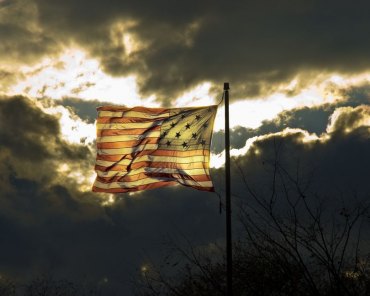War of 1812:
Francis Scott Key, land of the free and slavery

Written in the dawn’s early light of Sept. 14, 1814, after Baltimore’s Fort McHenry had withstood a British attack in the War of 1812, the song includes these words in the third verse (written here in normal sentence structure rather than verse form):
"And where is that band who so vauntingly swore that the havoc of war and the battle’s confusion, a home and a country should leave us no more? Their blood has wash’d out their foul footstep’s pollution. No refuge could save the hireling and slave from the terror of flight or the gloom of the grave. And the Star-Spangled Banner in triumph doth wave o'er the land of the free and the home of the brave.”
That verse mockingly derides the British for—in Key’s words—failing in their sworn mission to destroy the United States through “the havoc of war.” And a land polluted by the “foul footsteps” of invading British soldiers has been washed clean by the blood of Brits the Americans have killed.
That gory imagery alone would be enough to eliminate the third verse from most renditions of the song, but then Key throws in the part about the “hireling and slave” who will be forced to flee in terror or face death because there will be no place where they can feel safe.
In his line about slaves, Key is referring specifically to African-Americans recruited for a British Navy unit formed just for them and called the Colonial Marines, according to historian Gene Allen Smith in The Slaves’ Gamble: Choosing Sides in the War of 1812 (2013, Palgrave Macmillan). Slaves joined the Colonial Marines “because they had been promised freedom and wanted to exact some revenge against their former masters,” Smith writes.
A hireling in this context is someone who is willing to do just about anything for money, including tasks considered offensive. Key may be talking about the former slaves who joined the British forces, Britain’s use of mercenary soldiers from other countries or even British troops themselves.
Key (1779-1843) held strong views about slavery—both for and against it.
He was born about 50 miles northwest of Baltimore on the plantation of a wealthy family that owned slaves. Key studied law in Annapolis, Maryland, and practiced in Frederick, Maryland, before moving to the nation’s capital. The highly regarded Washington lawyer owned several slaves and defended slaveholders in disputes regarding their ownership of African-Americans.
President Andrew Jackson appointed him U.S. District Attorney in Washington in 1833. Three years later, using the power of that position, Key prosecuted a white doctor, Rueben Crandall, who had brought abolitionist literature into the city. Key charged that that publications in Crandall’s possession could be used to incite slaves into rebellion. A jury found the doctor not guilty.
The actions of a slave-owning lawyer who defended other slaveholders and prosecuted abolitionists are not something we can proudly hail, but Key also exhibited attitudes and actions that can be praised.
He freed at least some of his slaves during his lifetime. In his law practice, Key took cases on behalf of free blacks and slaves who argued they were entitled to freedom under laws that had already put some restrictions on the slave trade. At times, he provided those services for free.
Key represented the U.S. government—during the administrations of James Monroe and then John Quincy Adams—as it tried to convince the Supreme Court that Africans brought to the U.S. in 1820 on the Antelope should be freed. The ship, flying an American flag, had been intercepted off the coast of Florida by a U.S. customs vessel whose crew found almost 300 slaves aboard, an apparent violation of an 1807 law banning the importation of African slaves for sale in the United States.
The federal government docked the Antelope in Savannah, Georgia, and began legal proceedings to free the slaves. But Spain and Portugal complained that some Africans on the Antelope belonged to Spanish and Portuguese slave traders.
The Supreme Court, against the objections of Key and U.S. Attorney General William Wirt, ruled in an 1825 opinion written by Chief Justice John Marshall that the United States had to recognize the rights of other countries where the slave trade was still legal. The court allowed about 40 captives to be sold as slaves to compensate Spanish owners but denied the claims of Portugal. The other slaves were transported back to Africa and freed. (See the ruling here.)
How could the lawyer who argued passionately against the slave trade in 1825 turn around and prosecute a man for distributing abolitionist literature in 1836? Key reportedly said in one speech, “Where else, except in slavery, was ever such a bed of torture prepared by man for man?” How could the man who spoke those words own slaves for much of his life?
It seems the author of the “Star-Spangled Banner,” like Thomas Jefferson, the author of the Declaration of Independence, clearly knew slavery was wrong but was unwilling to be a true leader in its elimination.
Related:
Smithsonian plans Star-Spangled Banner event
Looking back: September marks milestones
Recommended:
Argument of John Quincy Adams in the Amistad case

